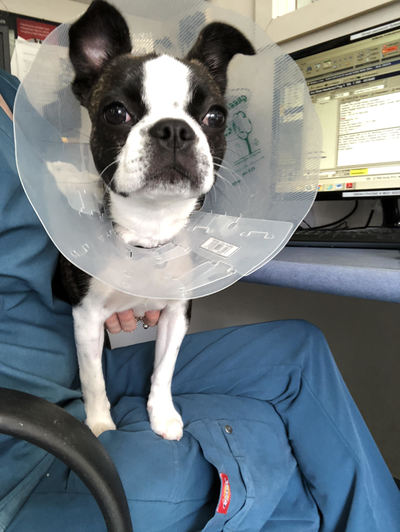Desexing
Reasons to desex your pet - Spey - Neuter - Castrate - Desexing benefits - Pros of desexing your dog - Should you let your dog have a litter before desexing?

Our puppies are available to pet homes only, and not for breeding, showing or available to have 'just to have a litter'.
Having our puppies go as pets who are desexed, not only gives us peace of mind that they won't end up in poor breeding conditions, but also that they are less likely to encounter certain risks and health concerns.
Desexed dogs do not pose the same health and behavioural problems, as un-desexed dogs do. For boys, there aren't risks of testicular cancer, prostate cancer, perineal hernias, urine marking, and they are less likely to encounter aggression and be involved in dog fights, and straying to find a mate.
For the girls, this reduces the risk of mammary cancers, pyometra (bacterial infections of the uterus, which is life threatening and emergency surgery is required), ovarian cysts. Urine marking, aggression, escaping to find a mate is common among undesexed girls, and often results in an increased number of stray dogs or escaped male dogs loitering your property, trying to interact. Unplanned matings can occur, and may be from larger breed dogs, causing problems.
Many undesexed dogs often hurt themselves trying to escape, and those that manage to make it out are often (and very sadly) hit by cars, and even stolen.
There are less risks of straying and roaming, and the dogs will be better suited for family dogs and young kids also when desexed.
Allowing a male or female dog to have an immature litter or mating can be problematic, and often life threatening for a girl and her unborn puppies. This is also very expensive, with caesarians being required. Awaiting for a dog to reach sexual maturity ' to have just one litter' before being desexed, still runs all the same risks as mentioned above.
Mature age desexes often won't have any behavioural improvements after being desexed, as behaviours such as urine marking have already been learnt. Once testosterone levels drop for example after being desexed, this may reduce the desire to urine mark - but won't eliminate the 'cocking of the leg to urinate' completely.
Health benefits can still apply to mature age desexes, and is encouraged and carried out for ex-show dogs and those who are no longer breeding or intended to sire.
It takes a great deal to manage and care for an undesexed dog, and problems are often encountered, especially if not well managed or an experienced breeder/show handler.
For the above reasons, we cover the cost of desexing for our puppies, at our vet.*
They are very well taken care of, by the team at Great Western Animal Hospital.
Having our puppies go as pets who are desexed, not only gives us peace of mind that they won't end up in poor breeding conditions, but also that they are less likely to encounter certain risks and health concerns.
Desexed dogs do not pose the same health and behavioural problems, as un-desexed dogs do. For boys, there aren't risks of testicular cancer, prostate cancer, perineal hernias, urine marking, and they are less likely to encounter aggression and be involved in dog fights, and straying to find a mate.
For the girls, this reduces the risk of mammary cancers, pyometra (bacterial infections of the uterus, which is life threatening and emergency surgery is required), ovarian cysts. Urine marking, aggression, escaping to find a mate is common among undesexed girls, and often results in an increased number of stray dogs or escaped male dogs loitering your property, trying to interact. Unplanned matings can occur, and may be from larger breed dogs, causing problems.
Many undesexed dogs often hurt themselves trying to escape, and those that manage to make it out are often (and very sadly) hit by cars, and even stolen.
There are less risks of straying and roaming, and the dogs will be better suited for family dogs and young kids also when desexed.
Allowing a male or female dog to have an immature litter or mating can be problematic, and often life threatening for a girl and her unborn puppies. This is also very expensive, with caesarians being required. Awaiting for a dog to reach sexual maturity ' to have just one litter' before being desexed, still runs all the same risks as mentioned above.
Mature age desexes often won't have any behavioural improvements after being desexed, as behaviours such as urine marking have already been learnt. Once testosterone levels drop for example after being desexed, this may reduce the desire to urine mark - but won't eliminate the 'cocking of the leg to urinate' completely.
Health benefits can still apply to mature age desexes, and is encouraged and carried out for ex-show dogs and those who are no longer breeding or intended to sire.
It takes a great deal to manage and care for an undesexed dog, and problems are often encountered, especially if not well managed or an experienced breeder/show handler.
For the above reasons, we cover the cost of desexing for our puppies, at our vet.*
They are very well taken care of, by the team at Great Western Animal Hospital.







































